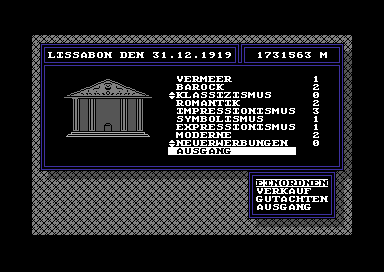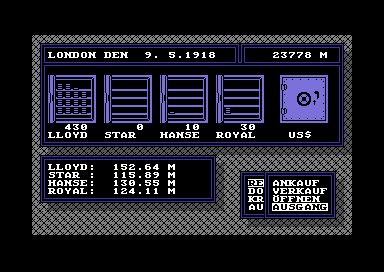
You start exactly on January 1, 1918. When you're done. depends only on you. The best players can survive even the turbulent period of 1939-1945, profiting from supplies for the military. 1918 and the following years were a very turbulent period. These times are full of uprisings, coups and government coups that are almost the order of the day. Poverty rages, inflation eats up income. There is no one, but certain currency, bonds and stocks become worthless overnight. Banking systems are rusting from scratch. foundations of the world's greatest powers are crumbling. Surprisingly, you are one of the few who are very lucky. You are offered a loan of 50,000 marks, on very favorable terms. The bank from which you get it is not very demanding, the money must be spent on agricultural development and food production. There is no fixed currency in the game. You can trade brands, but it's quite a dangerous method. At the end of each month, there is a list showing the dollar's rate against the mark, which clearly shows the devaluation of mark. So in order not to lose, it is worth using either dollars or shares. What are these sheres? These are the papers you pay for and are yours.


The value of a given share depends mainly on the prosperity of the company that issued the share. So it is logical that the value of a stock changes over time. I know from experience that in Vermeer it is most profitable to buy LLOYD. If you think otherwise, you can purchase one of the three others: STAR, HANSE, ROYAL. The main game fun is about establishing plantations, growing the most fertile plant and selling the crops. Only at first glance it seems like a child's play, but it really is quite a difficult art. Just in case, I will give you a detailed course: buy, sell, sow.

It all starts when you arrive at the plantation. Let's say it's Ankara, and let's also find out that tea is best taken there. I spend enough to buy tea seeds that I still have enough money to buy the land for sowing. Now I sow plots of land and employ workers, preferably two per hectare. I don't have to pay them in advance. But I remember that soon they will ask for money. I know how much cash I should have to pay for them and to send the crops to the market for sale. If it is good, I wait three months and I am happy (or worried) with the results obtained. Now for some more specific information. You start in London, where you should go straight to the bank. There you can buy the appropriate shares (LLOYD, STAR, HANSE, ROYAL). When you need to make a large investment, you can easily sell previously purchased stocks with larger amounts and will gain value over time. In addition, you can take a loan at the bank, maximum 32,000 marks. Without this operation, you will not start any plantation, because you simply will not have enough money. From now on, you have the full right and duty to go to one of twelve locations in the world (Ankara, Mombasa, Abidjan, Douala, Bombay, Colombo, Rio, Bogota, Guatemala, Maksyk, Richmond, St. Louis) and try your hand there. Of course, you pay for the ride and the price depends on the distance. During your trip, you receive messages with transaction proposals. So, when they offer you delivery of tea in three months' time, don't hesitate a moment. Prices are usually very favorable, and you will decide the amount of tea yourself.

If, on the other hand, you do not like to be bound by contracts, then do not conclude them. The game will become a bit more difficult, but much more interesting. You also get information messages. These are news about current events around the world, wars, price changes, coups, etc. These data help you "feel" the market and act accordingly. You spend as much time on plantations as you do on a journey, but you lose much more energy. Because here you buy plots of land to ensure sufficiently high production. After sowing, you can, of course, carry out any reforms, but for safety reasons I do not advise you. Enjoy what you have. On the plantation itself, there is a shop where you can buy four basic types of seeds: coffee, tea, cocoa and snuff. There you also check delivery times, failure to meet them may result in serious penalties. Cheap labor, commonly known as workers, is the least certain of the business. It is easy to buy them, and even easier to cheat on salary. Those who belong to the Vermeer aristocracy and suffer from chronic financial surplus can collect paintings. There are works by painters from the Impressionist, baroque, classic and other periods. All you need to do to buy a painting is to go to the auction in good time to one of the famous European cities: Paris, Amsterdam, Lisbon, Berlin, Bonn and London. Having a lot of money and time, you outbid even the fiercest collectors, becoming a well-known and valued trader. With a bit of luck, you'll even buy a painting of Vermeer himself!
C64 (but game also on Atari, Amstrad, Amiga)
My rate: 8/10